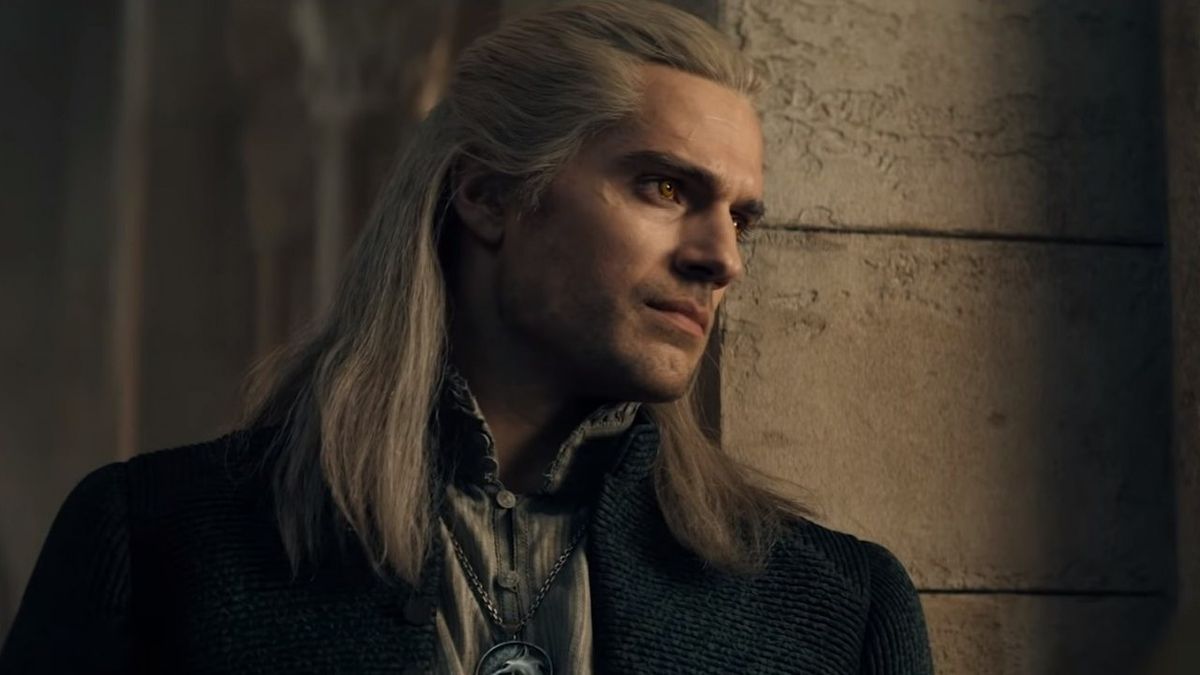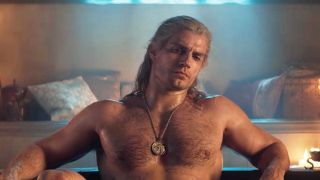The Witcher Netflix series showrunner on timelines, season 2, and why Henry Cavill is the perfect Geralt
We talk to Lauren S. Hissrich about all things Witcher

There haven’t been many shows in recent years as hotly-anticipated as The Witcher Netflix series. Though you may not know it yet, that’s all down to showrunner Lauren S. Hissrich, who has guided the show from a kernel of an idea to the Continent-spanning finished product that you’re probably already busy binging. We recently had the chance to sit down with her after finishing the series to talk timelines, season 2, and the best piece of advice she was given by Witcher author Andrezj Sapkowski.
SPOILER WARNING: Our Q&A with Hissrich contains multiple spoilers for the first five episodes. Proceed at your own caution.

By about episode 2 or 3, the penny sort of starts to drop that we’re operating across several years and timelines. I was wondering what you thought about telling the story that way?
You know, it started, honestly, as a logic— a solve for a logic problem. Which is that I knew that I wanted to start telling the stories based on The Last Wish. It was the first book that I read. It was the first book that I fell in love with.
And I really liked how it presented the world. It really gives you the best indication of the politics at play – the kingdoms, what Witchers are, what the monsters are that Geralt is fighting, and what they mean, and how Witchers are seen in this world. So that’s something that was really important to me.
The problem with those stories, to me, is that Yennefer and Ciri aren’t very present in them. Ciri, especially, isn’t even born during that time yet.
So I wanted to bring their stories up, and I wanted to do those stories for Geralt. And it really became very evident that I needed to start to play with time a little bit.
Sign up for the Total Film Newsletter
Bringing all the latest movie news, features, and reviews to your inbox
Honestly, it’s one of those decisions I kind of made on a lark, and yet it’s one of my favourite parts of the entire series, because it allows the viewers to be on a journey with us, and to have a mystery unfold in front of their eyes.
You’ve mentioned before, you’ve auditioned or considered 207 actors for Geralt. But what makes Henry Cavill the perfect Geralt for you?
It’s really an almost… It’s hard to articulate. Because Geralt is such an interesting character. Obviously, in the books, he’s incredibly stoic and does not wear his heart on his sleeve. And yet he’s oddly guided by his heart at the same time, and by his desire to be a hero. Even though he makes really questionable decisions at times, he’s very serious, and yet also has this really dry sense of humour.
We’re asking an actor to do a lot. And we had started to see in the auditions— we auditioned some wonderful actors. But there was always something missing, or it felt like all of those aspects didn’t work together. They weren’t coming from the same human.
When we sat down and Henry actually read for us – he auditioned, which is very rare for an actor of his calibre to be willing to do that – but he was so passionate about playing this role, and so fully embodied who we all thought Geralt was.
I was actually in the room at the time for his audition, but then we sent tapes out to producers, and they immediately felt the same way. Like, 'Oh, that’s our guy.'
It’s kind of an indescribable thing, and yet you know it when you have it.
People are describing The Witcher as the new Game of Thrones. I wondered what you felt about that comparison?
The comparison is ultimately incredibly flattering, because at the end of the day, for a new television show to be premiering into a world, and for people to be saying, “I think it could be as successful or as popular as that show” – that’s incredible.
I feel like as a writer, I owe a huge debt of gratitude to Game of Thrones, because it really blew open the doors for fantasy on television. And it took it away from being a genre that has mostly been dominated by men and sort of been seen as this niche audience of geeks and nerds, and it sort of allowed a whole worldwide audience to say, 'Fantasy is for us as well.'
All of that being said, I think The Witcher stands on its own two feet very, very well. And it’s a very different story. I think the tone is incredibly different than Game of Thrones. And when viewers come in, I think they’ll see that right away.
You’re probably tired of hearing the quote back at you about having plans for seven seasons – I know you can’t talk specifics about season two, but I was wondering which of the short stories from The Witcher will inform or inspire that second season?
I think it’s natural when you write anything that you start thinking about the dominoes that will fall after that moment in time, and the stories that can be inspired by them.
There are definitely things that we know we want to do. You know, in our brains, as writers, we say, ‘Oh, that could happen at the end of season three' or 'That will happen in season seven.'
The truth is, we have a tonne of source material. We could write the show for a very, very long time. What’s great about season two, I can tell you, is that, in what we’ve written, the story becomes much more focused. There’s a stronger drive in the story, because all of the relationships that we’ve been setting up in season one, actually start to come into fruition in season two.
Characters start meeting and interacting more. That goes well sometimes. It doesn’t go well sometimes. But it’s kind of like, all of those building blocks that we set up for the world, finally start to come together into something a little more concrete.
You’ve worked closely with [author] Andrzej Sapkowski. What is the best advice he’s given you?
When I pitched him the series, he signed off on my vision of the series, and how I imagined telling his stories, and honouring his stories.
The best piece of advice that I heard from him is not actually about The Witcher, it’s about writing.
He taught me to hire people that I trust, and to then trust them to do their jobs. So he hired me to adapt this piece of work, and he is actually allowing me to do it. And that’s what’s so incredible. He is not a micro-manager. And that has informed how I do my job as a showrunner, which is that I hire department heads, who then I trust to do their jobs very well, and I don’t have to be in every single piece of their business. Which is probably good for them, too.
Thinking back to day one, and you were kind of given the keys to the kingdom of The Witcher. What was one of your biggest fears at that point?
Adapting anything that has this much source material – the first challenge is where to start your storytelling. What to tell? What to get out there? How to make it both appealing, both to an existing fanbase, and also hopefully new viewers? And how to make sure you’re riding that balance really well?
For me, the biggest surprise? I had no idea how worldwide the fandom for The Witcher was. I have been constantly impressed and excited by and enthused by seeing all the fans come out from all corners of the globe, to say why The Witcher is important to them.
When I first came onto the show, I expected it to be mostly— for fans mostly to be excited about magic and monsters and sword fights and blood and sex and those sort of bells and whistles.
What I realised very quickly is that fans love the same thing that I do, which is that they love Geralt, Ciri and Yennefer. They love seeing the journeys of these three loners, basically, who start to then find each other and embrace each other.
You mentioned Geralt and the three leads – beyond that, who’s someone in the wider cast you want to give a shout out to, or someone who may be more overlooked?
Oh my goodness, there are so many. Eamon Farren as Cahir is really amazing. Cahir is considered the villain of the first book. The truth is that what I think we’ve gotten to is sort of the heart and soul beneath this character.
Not – again – that we always agree with what he’s doing. But what we’ve done is dug in and tried to understand why he’s doing it. That’s what I look for in all of the characters – a sort of relatabilty. If I understand why they’re doing it – even if I don’t agree with them, I’m going to be interested in watching them.
And then I would say MyAnna Buring as Tissaia is a real cornerstone of the first season. That’s one of those perfect examples where you start writing a character, and I didn’t have any intention of her being a huge character. But as soon as that story started unfolding, and as soon as I saw MyAnna working with Anya Chalotra, who plays Yennefer, and I started seeing their mother/daughter relationship come to life – I knew that had to be a much bigger part of my series.
The series based predominantly on the books but there’s actually one moment that’s taken on a life of its own from the games, which is the bathtub scene.
The bathtub scene, yes.
I wanted to know your process behind bringing that meme to the Netflix series?
We consistently go back to the source material for the show. And there are several bathtub scenes in the show, including that one, which is the Last Wish story. It is fun to visually throw a wink and a nod at videogame fans, to say, 'We see you too. We know you’re here.' And we want them to be happy with what we’re doing as well.
Need more guidance on the show's chronology? Here is The Witcher Netflix timeline, explained.
I'm the Senior Entertainment Writer here at 12DOVE, focusing on news, features, and interviews with some of the biggest names in film and TV. On-site, you'll find me marveling at Marvel and providing analysis and room temperature takes on the newest films, Star Wars and, of course, anime. Outside of GR, I love getting lost in a good 100-hour JRPG, Warzone, and kicking back on the (virtual) field with Football Manager. My work has also been featured in OPM, FourFourTwo, and Game Revolution.
Most Popular
